Glenn Frey (1948-2016) was the soul of The Eagles. The band’s success allowed them to enjoy everything that life had to offer them. The conclusion that they came to could not have been more disheartening.
In this series of deaths of popular culture icons, including Bowie and Prince, others will pass by unnoticed, despite having had as much influence as Glenn Frey (1948–2016), the soul of the Eagles. His band was probably the American West Coast group that had the greatest influence in the 1970s. It had so much success, that it enabled them to enjoy everything that life had to offer them. The conclusion that they came to could not have been more disheartening. Vanity of vanities, all is vanity…
At the end of the 1960s a creative community of singer-songwriters and cocaine-addicted cowboys congregated in the Los Angeles canyons – according to the British critic Barney Hoskins, who is the author of an interesting book on this period, Hotel California –, and were to revolutionize the world of rock. To bands like The Eagles, nightclubs like the Troubador on Santa Monica Boulevard seemed to be a “holy place, protected by amazing grace”, according to the lyrics of The Sad Café. In it, the likes of Glenn Frey provided entertainment to a “lonely crowd”, when they hadn’t a dime to their names.
But then, on a hot day in August 1971, five naked men were sitting in a sauna in Los Angeles. Four of them were musicians and the fifth was a famous businessman with a formidable reputation, David Geffen. He told them of his plan to set up a record company, Asylum, which he wanted to keep “small”. He said that he would never take on more artists than could fit into that sauna. Twenty years later he would sell his second label for 550 million dollars, while The Eagles – the band formed by two of those musicians– became the most successful band in the United States.
DON’T EVEN TRY TO UNDERSTAND
The Eagles were something else. While Neil Young and Joni Mitchel were intuitive and unpredictable artists, Glenn Frey and Don Henley set up the band to sell millions of records. They both lived in a shack in the hills near the Hollywood Bowl. Before appearing in the Troubadour, they prepared themselves for a while in a small club in Aspen (Colorado) called Gallery, in the late autumn of 1971. When they returned to Los Angeles, they were ready to take over the world…
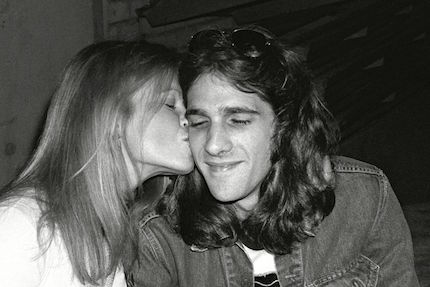 Glenn Frey, when his life was full of groupies and cocaine.
Glenn Frey, when his life was full of groupies and cocaine.
Among the songs that defined their debut with Asylum in 1972, the song by Jackson Browne, Take It Easy, sounded to Frey like a hit from the first. The feeling of relaxation that its words inspire, seems to capture the dream of freedom that filled California at the end of the sixties. Frey added a few lines such as “it’s a girl, my Lord, in a flatbed Ford”, directed at an unsettled youth, “lighten up while you still can, don’t even try to understand”.
That was the calm side of the Eagles that attracted the British producer Glyn Johns, who had worked in London with the Rolling Stones and Led Zeppelin. To his chagrin, the group wanted a harder and dirtier sound. Their publicity positioned them somewhere between the vanguard and the commercial end of the spectrum. When they went back to Los Angeles they began holding their concerts in the exposition of a Texan artist who worked with cow skulls. This was something that would become part of The Eagles’ image. They were the new sound of southern California, as suggested by the album’s cover picture of a desert with a Joshua Tree. In reality, however, none of them came from there…
DESPERADOS
At the end of 1972, Geffen sold his company to Warner, and Asylum joined the Atlantic label. His words in the sauna evaporated leaving the musicians feeling betrayed. That was the cue for Irvin Azoff, a formidable manager who offered to represent the Eagles. The group had just produced a conceptual album, presenting rock stars as bandits. The album was the result of work by Frey and Henley, who by then lived in the Laurel Canyon, surrounded by wine, women and songs, as well as poker and cocaine…
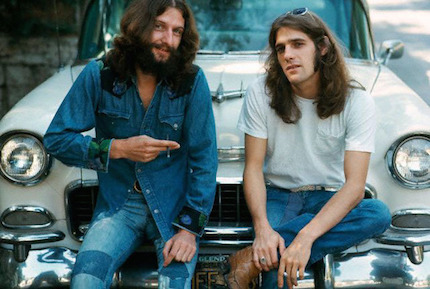 Glenn Frey and producer Paul Ahern.
Glenn Frey and producer Paul Ahern.
The main character of Desperado (1973) is like the Preacher in the book of the Old Testament, Ecclesiastes. He is looking for one thrill after another. It is a restless spirit, prisoner of its own desire, possessing everything that this materialistic world can offer, but still not satisfied.
The empty hedonism of Desperado presents us with a man without rest, who tries to quench his thirst with the pleasures of this world, but who finds that the more he has, the thirstier he gets. No matter how good things are, he always wants something else.
HOTEL CALIFORNIA
It was however their 1976 album, Hotel California, that provided the harshest description of the emptiness of everything that fame and money can achieve in this world. Life in the Fast Lane led to The Last Resort, “where pretty people play, hungry for power”. The optimism of the 1970s gave way to the end of the party…
In an interview, Don Henley recalled that the first half of the 1970s had been a time of great escapism. However, by the end of the decade, they found that they were just doing a lot of LSD and saying that they would be revolutionary, but in fact changing nothing.
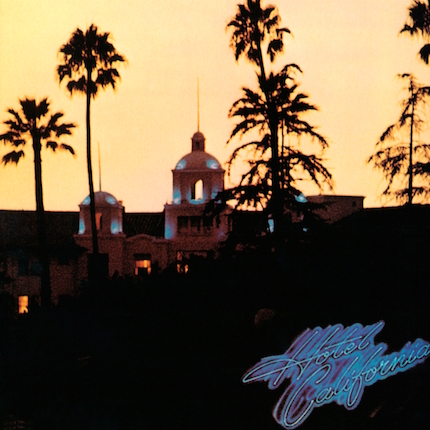 Hotel California is the Ecclesiastes according to the Eagles.
Hotel California is the Ecclesiastes according to the Eagles.
According to him, Hotel California tried to see things in a different light, asking the question of where they were heading and what new off-stage values could give them more meaning and value. His sweet play of voices and country roll reflect the self-compassion of these road-weary Californians, looking for peace in their minds after a “fruitless life”…
BERNIE LEADON
One of the founding members of the band, the bass guitar player Bernie Leadon, is now a Christian. When the British evangelical author Steve Turner asked him how he remembered those songs, Leadon said that he still thought that they revealed a lot about the human nature, but that they did not provide the answer. Although the band had a lot of good things going for it, he came to the realization that they always wanted what they didn’t have, and that it was therefore impossible to be satisfied.
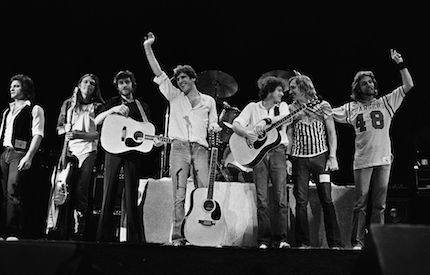 Glenn Frey raises his hand during The Eagles best time in 1979.
Glenn Frey raises his hand during The Eagles best time in 1979.
In “‘Hotel California' they ended up saying we're stuck, we can't get out,” he says. They were “victims of our own appetites”. The musician recalls that they were trying to “satisfy our physical desires or our emotional needs and so we need more sex, more money and more food. Then we need more exciting sex and better tasting food. I've heard people say, ‘Give me more of everything and then I'll be satisfied.' But ultimately you're not.”.
A LONG WAY EAST OF EDEN
The author of Ecclesiastes has the same problem when he discovers that all is vanity. Life is so short (1:4) and you “can’t get no satisfaction”, as the Stones put it. There is nothing new under the sun (v. 9-11). All that remains is our desire and dissatisfaction, after this long road out of Eden…
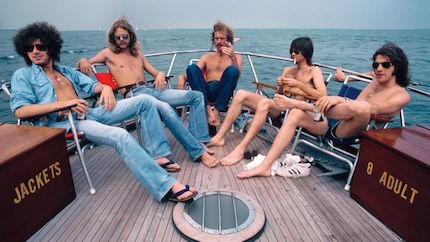 The Eagles enjoyed a very luxurious life.
The Eagles enjoyed a very luxurious life.“Need is the religion of the religionless”, says the evangelical sociologist Tony Walter in his book All You Love is Need, “the morality of those who pride themselves on having progressed beyond morality”. The problem is, who will satisfy that need? It is there that the Preacher concludes: Remember your Creator (Ecc. 12:1). Forgetting Him is our spiritual death. Remembering him is to know life and to live it in abundance.
Life is a one-way journey (v. 5 ss.). There is no reincarnation, no return to life through technology. It is a journey towards eternity, in which only the Good Shepherd can guide us (Psalm 23). He has given his life for us (John 10:11). The question is whether we are prepared to follow him…

Las opiniones vertidas por nuestros colaboradores se realizan a nivel personal, pudiendo coincidir o no con la postura de la dirección de Protestante Digital.
Si quieres comentar o